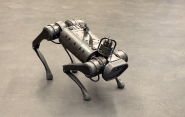For making robots adaptable, Ian Abraham wins NSF CAREER Award

For a project that aims to give robots greater adaptability, Prof. Ian Abraham has won the 2023 Faculty Early Career Development (CAREER) Award from the National Science Foundation (NSF).
 The NSF CAREER award - which comes with a substantial five-year grant - is a prestigious honor for young faculty members and supports the early career activities of teachers and scholars who are most likely to become the academic leaders of the future.
The NSF CAREER award - which comes with a substantial five-year grant - is a prestigious honor for young faculty members and supports the early career activities of teachers and scholars who are most likely to become the academic leaders of the future.
The ability of humans to adapt in new environments and learn from a few interactions has long been a goal in the field of robotics. For example, when humans step on ice, it only takes a few shuffles of our feet until we learn to glide. Typically, though, the closest robots have come to humans’ nimble ways of navigating their surroundings has required immense amounts of data and computation.
Abraham aims to correct this by developing algorithms that allow robots to reason about interactions with the environment that optimize learning manipulation and locomotion skills.
“People often don't realize that once you deploy a robot, if anything in the environment changes, you have to change how the robot is programmed to account for discrepancies,” said Abraham, assistant professor of mechanical engineering & materials science. “So the question I had was, how can we get robots to search for interactions that provide information about the environment to quickly learn new skills on their own? More interestingly, can we demonstrate mathematically that the robot will always exhaust all possible interactions that show reliability in learning new skills is attainable?”
The project’s main focus is on developing formal methods through optimal control theory that give robots the ability to efficiently solve learning problems in real time. The long-term goal is to develop the mathematical machinery for robots to plan how to learn in as few interactions as possible. This will lead to a shift away from large computational modules to on-board, real-time robotic systems that can learn skills that they haven’t previously attempted.
“We will formulate learning for robotics as an optimal control problem, so we can solve it with formal guarantees, and that's something that really hasn't been explored enough,” he said.
Much of the work in this field, he said, has involved creating probabilistic models from large data repositories - that is, the robot is programmed to perform a particular action in a particular situation based on the likelihood of certain outcomes based on data.
“In this work, we want to make stronger statements based on mathematical guarantees that the robot behaves such that it will learn in a certain number of interactions,” he said.
Abraham points to examples such as picking up a set of keys or reaching for an unknown object - the kinds of things that humans do with ease but are deceptively complex tasks for robots.
“What we're trying to figure out is how can we solve for these behaviors?” he said. “What are those behaviors, and can we optimize for it? So, we're sort of doing the backwards problem. We're saying, let's formulate what we think the solution should be and investigate mathematical principles that answer why some behaviors are more reliable than others.”

